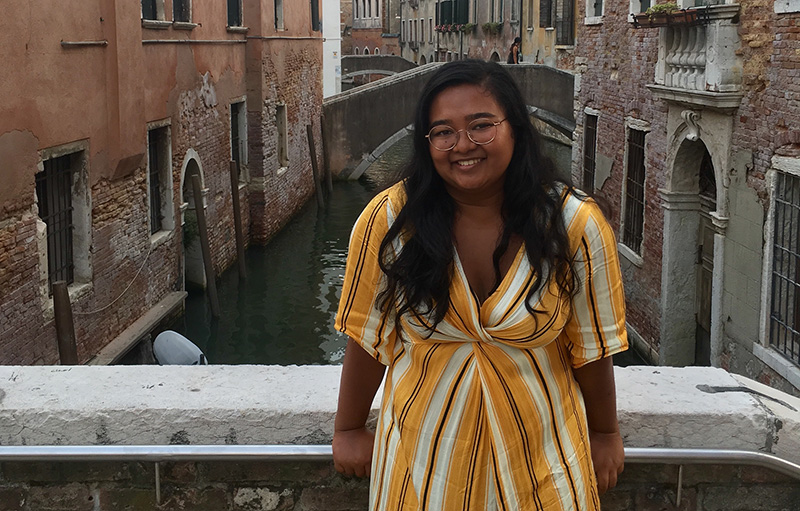
Ellen B Brewster, a DPhil student researching eighteenth-century elocution books
My DPhil shows that reading doesn’t have to be a solitary endeavour – and nor does research. Perhaps it takes a village, or a college, to write a doctoral thesis.
I came to Oxford in 2013 after receiving a Moritz-Heyman Scholarship, having visited the college the year before whilst on the UNIQ Summer School. The trip helped me discover that Oxford – and university in general – might be for me! I picked Exeter because one of our English fellows, Jeri Johnson, taught on the summer school and recommended applying here. Looking it up afterwards, I thought it looked suitably old and grand. Seven years later, and I’m still here! I did (briefly) abscond to University College for an MSt in English, but I’m back at Exeter now thanks to the generosity of the Amelia Jackson Senior Studentship, which pays my fees and stipend.
I’m currently what some call an ‘early-career researcher’. I’m roughly halfway through my DPhil project, using eighteenth-century elocution books to understand how people conceptualised reading, and to explore the relationship between print and orality. I love second year – I’m far enough into my project to have an understanding of what it might be about, but still a way off actually having to hand it in!
Recently I’ve been trying different academia-related activities. As the Graduate Teaching and Careers Officer at the English faculty, I organise a seminar series relating to academic careers; I’ve also been teaching eighteenth-century literature to undergrads, and learned a lot about learning in the process. I’ve been involved in research projects and workshops, including hosting a mock ‘spouting club’. (‘Spouting’ involves reading poetry in pubs to an audience, much like eighteenth-century karaoke, but with less Britney and more Bard.) In the midst of this, I’ve also been drafting chapters of my DPhil – honest.
I’m still deciding what I’d like to do after leaving Exeter. I really enjoy academic life, and would love to continue teaching and research, but I’ve also been thinking about the kinds of work I value doing – and where else I might be able to do that. I’d like to use the skills I’ve developed at Oxford: research, presentation skills, and my talent for cramming a diary implausibly full. (Let’s call that last one ‘organisation skills’.)
Initially I was uncertain about how to write this piece: I’m not sure how to articulate where my college career has led me. But that’s not the most useful way of looking at it; as an early-career researcher, I often get to lead, rather than be led. I suppose I’m the big cheese of my doctoral project, after all, even if I don’t always feel in charge of my material.
Reading for a doctorate is one of the hardest things I’ve ever done, and I couldn’t do it alone. Throughout my time at Oxford I’ve had many supportive supervisors, tutors and colleagues who have encouraged me when other aspects of life might have halted my education and research. I’ve also made some stellar friends. My DPhil shows that reading doesn’t have to be a solitary endeavour – and nor does research. Perhaps it takes a village, or a college, to write a doctoral thesis.
